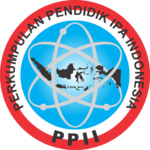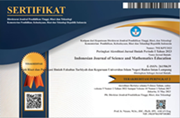Analysis of The Elementary School Teachers’ Ability to Use Technology on The Mathematics Online Learning
Abstract
Keywords
Full Text:
PDFReferences
G. K. W. Wong, “Engaging students using their own mobile devices for learning mathematics in classroom discourse: A case study in Hong Kong,” Int. J. Mob. Learn. Organ., vol. 8, no. 2, pp. 143–165, 2014, doi: 10.1504/IJMLO.2014.062352.
P. Kahn, L. Everington, K. Kelm, I. Reid, and F. Watkins, “Understanding student engagement in online learning environments: the role of reflexivity,” Educ. Technol. Res. Dev., vol. 65, no. 1, pp. 203–218, 2017, doi: 10.1007/s11423-016-9484-z.
Fitriani, S. Fatimah, and T. Herman, “Blended learning based on ebook integrated Youtube in learning mathematics,” J. Phys. Conf. Ser., vol. 1806, no. 1, 2021, doi: 10.1088/1742-6596/1806/1/012065.
K. Purcell, A. Heaps, J. Buchannan, and L. Friedrich, “How Teachers Are Using Technology at Home and in Their Classrooms | Pew Research Center’s Internet & American Life Project,” Pew Res. Cent., p. 108, 2013, [Online]. Available: http://www.pewinternet.org/2013/02/28/how-teachers-are-using-technology-at-home-and-in-their-classrooms/.
T. Sutarsih and A. Hasyyati, “Penggunaan dan Pemanfaatan Teknologi Informasi dan Komunikasi (P2TIK) Sektor Pendidikan 2018,” BPS Republik Indones., p. 52, 2018, [Online]. Available: https://www.bps.go.id/publication/download.html?nrbvfeve=Mjc5NzE4NDVhOWQ2MTYzNDEzMzNkMTAz&xzmn=aHR0cHM6Ly93d3cuYnBzLmdvLmlkL3B1YmxpY2F0aW9uLzIwMTgvMTIvMjQvMjc5NzE4NDVhOWQ2MTYzNDEzMzNkMTAzL3BlbmdndW5hYW4tZGFuLXBlbWFuZmFhdGFuLXRla25vbG9naS1pbmZvcm1hc2ktZGFu.
F. M. E. Tukan, “Challenges and Strategies Using Application in Teaching Online Classroom During Pandemic Covid-19,” J. English Linguist. Lit. Educ., vol. 2, no. 2, pp. 155–172, 2020.
A. N. Fadilla, A. S. Relawati, and N. Ratnaningsih, “Jurnal jendela pendidikan,” vol. 01, no. 02, pp. 48–60, 2021.
A. S. R. Hutagaol, “Analisis Kesulitan Guru Matematika Kelas VII Dalam Menerapkan Pembelajaran Daring Selama Pandemi Covid-19 Di SMP Nusantara Indah,” J. Ris. Pendidik. Mat. Jakarta, vol. 3, no. 2, pp. 16–22, 2021, doi: 10.21009/jrpmj.v3i2.22121.
M. F. Annur and Hermansyah, “Analisis Kesulitan Mahasiswa Pendidikan Matematika Dalam Pembelajaran Daring Pada Masa Pandemi Covid-19,” J. kajian, Pnelitian dan Pengemb. Kependidikan, vol. 11, pp. 195–201, 2020.
Y. D. Puspitasari and P. A. Nugroho, “Peningkatan Higher Order Thinking Skill dan Kemampuan Kognitif pada Mahasiswa melalui Pendekatan Science, Environment, Technology and Society Berbantuan Modul Pembelajaran,” J. IPA Pembelajaran IPA, vol. 4, no. 1, pp. 11–28, 2020, doi: 10.24815/jipi.v4i1.14608.
B. Kusumaningrum and Z. Wijayanto, “Apakah Pembelajaran Matematika Secara Daring Efektif? (Studi Kasus pada Pembelajaran Selama Masa Pandemi Covid-19),” Kreano, J. Mat. Kreat., vol. 11, no. 2, pp. 139–146, 2020, [Online]. Available: https://journal.unnes.ac.id/nju/index.php/kreano/article/view/25029.
S. Tri Putri and D. Rahman Munandar, “Analisis Kendala Pembelajaran Matematika Berbasis Online (E-Learning) Pada Masa Pandemi COVID-19,” J. Absis J. Pendidik. Mat. dan Mat., vol. 3, no. 2, pp. 320–327, 2021, doi: 10.30606/absis.v3i2.811.
A. Asmuni, “Problematika Pembelajaran Daring di Masa Pandemi Covid-19 dan Solusi Pemecahannya,” J. Paedagogy, vol. 7, no. 4, p. 281, 2020, doi: 10.33394/jp.v7i4.2941.
R. P. Sari, N. B. Tusyantari, and M. Suswandari, “Dampak Pembelajaran Daring Bagi Siswa Sekolah Dasar Selama Covid-19,” Prima Magistra J. Ilm. Kependidikan, vol. 2, no. 1, pp. 9–15, 2021, doi: 10.37478/jpm.v2i1.732.
A. Anugrahana, “Hambatan, Solusi dan Harapan: Pembelajaran Daring Selama Masa Pandemi Covid-19 Oleh Guru Sekolah Dasar,” Sch. J. Pendidik. dan Kebud., vol. 10, no. 3, pp. 282–289, 2020, doi: 10.24246/j.js.2020.v10.i3.p282-289.
H. Faizah, Susilohadi, L. L. Prayitno, E. Ladyawati, and N. Mutianingsih, “WORKSHOP PENGELOLAAN PEMBELAJARAN JARAK JAUH BERBASIS APLIKASI VIDEO CONFERENCE,” Padi-Jurnal Pengabdi. Dosen Indones., vol. 4, pp. 7–12, 2021.
E. Sugandi, N. Fathonah, E. P. Astutik, and L. Nugraheni, “WORKSHOP PENGELOLAAN PEMBELAJARAN JARAK JAUH ( PJJ ) BERBASIS LEARNING MANAGEMENT SYSTEM ( LMS ) BAGI GURU SMKN 1 JETIS MOJOKERTO Eko Sugandi Nur Fathonah Erna Puji Astutik Liknin Nugraheni Abstrak,” Padi-Jurnal Pengabdi. Dosen Indones., vol. 4, pp. 1–6, 2021.
R. Rachmadtullah, B. Azmy, W. Susiloningsih, S. H. Rusminati, and A. Irianto, “MEDIA PEMBELAJARAN TEMATIK BERBASIS TIK: PKM BAGI GURU SD HANG TUAH X SEDATI,” Kanigara, vol. I, no. 2, pp. 7–16, 2021, [Online]. Available: http://e-journal.ivet.ac.id/index.php/manggali/article/view/1692.
Y. Yusrizal, I. Hajar, and S. Tanjung, “Analysis of Elementary School Teachers’ Ability in Using ICT Media and Its Impact on the Interest to Learn of Students in Banda Aceh,” Budapest Int. Res. Critics Linguist. Educ. J., vol. 2, no. 3, pp. 37–49, 2019, doi: 10.33258/birle.v2i3.352.
Y. Yusrizal and F. Fatmawati, “Analysis of Teacher Abilities in Implementing Online Learning in Elementary Schools of the North Sumatra Pab Foundation,” J. Ilm. Teunuleh, vol. 1, no. 2, pp. 129–137, 2020, doi: 10.51612/teunuleh.v1i2.27.
M. A. Bowman, V. W. Vongkulluksn, Z. Jiang, and K. Xie, “Teachers’ exposure to professional development and the quality of their instructional technology use: The mediating role of teachers’ value and ability beliefs,” J. Res. Technol. Educ., vol. 0, no. 0, pp. 1–17, 2020, doi: 10.1080/15391523.2020.1830895.
C. T. Rosidah, Amelia Widya Hanindita, Ida Sulistyawati, and Apri Irianto, “Peningkatan Kompetensi Guru Sekolah Dasar Dalam Pengembangan Bahan Ajar Daring di SDN Margorejo I Kota Surabaya Provinsi Jawa Timur,” Kanigara, vol. 1, no. 1, pp. 23–31, 2021, doi: 10.36456/kanigara.v1i1.3154.
Sugiyono, Metode Penelitian Kuantitatif Kualitatif dan RD. Bandung: Alfabeta, 2018.
M. M. Archibald, R. C. Ambagtsheer, M. G. Casey, and M. Lawless, “Using Zoom Videoconferencing for Qualitative Data Collection: Perceptions and Experiences of Researchers and Participants,” Int. J. Qual. Methods, vol. 18, pp. 1–8, 2019, doi: 10.1177/1609406919874596.
E. Purwanto and H. Tannady, “The Factors Affecting Intention to Use Google Meet Amid Online Meeting Platforms Competition in Indonesia,” Technol. Reports Kansai Univ., vol. 62, no. 06, pp. 2829–2838, 2020.
N. Septantiningtyas, J. Juhji, A. Sutarman, A. Rahman, N. Sa’adah, and Nawisa, “Implementation of Google Meet Application in the Learning of Basic Science in the Covid-19 Pandemic Period of Student Learning Interests,” J. Phys. Conf. Ser., vol. 1779, no. 1, 2021, doi: 10.1088/1742-6596/1779/1/012068.
A. R. Nasution and A. B. D. Nandiyanto, “Utilization of The Google Meet and Quiziz Applications in The Assistance and Strengthening Process of Online Learning During The Covid-19 Pandemic,” Indones. J. Educ. Res. Technol., vol. 1, no. 1, pp. 21–31, 2021, [Online]. Available: https://ejournal.upi.edu/index.php/IJERT/article/view/33367.
F. M. Amin and H. Sundari, “Efl students’ preferences on digital platforms during emergency remote teaching: Video conference, lms, or messenger application?,” Stud. English Lang. Educ., vol. 7, no. 2, pp. 362–378, 2020, doi: 10.24815/siele.v7i2.16929.
R. Aspriyani and A. Suzana, “Pengembangan E-Modul Interaktif Materi Persamaan Lingkaran Berbasis Realistic Mathematics Education Berbantuan Geogebra,” AKSIOMA J. Progr. Stud. Pendidik. Mat., vol. 9, no. 4, p. 1099, 2020, doi: 10.24127/ajpm.v9i4.3123.
F. Ningsih, A. Murni, and Y. Roza, “Development of Learning Tools with the Application of Learning Inventions to Improve Mathematical Problem Solving Ability Social Arithmetic Material Fadriati,” J. Educ. Sci., vol. 4, no. 1, pp. 146–152, 2020.
A. Agusriadi, E. Elihami, M. Mutmainnah, and Y. Busa, “Technical Guidance for Learning Management in a Video Conference with the Zoom and Youtube application in the Covid-19 Pandemic Era,” J. Phys. Conf. Ser., vol. 1783, no. 1, 2021, doi: 10.1088/1742-6596/1783/1/012119.
R. Yusuf, “Teaching EFL Students Using Selected Media: Offline Video Taken From YouTube,” Utamax J. Ultim. Res. Trends Educ., vol. 2, no. 1, pp. 29–33, 2020, doi: 10.31849/utamax.v2i1.2909.
DOI: http://dx.doi.org/10.24042/ijsme.v5i1.11021
Refbacks
- There are currently no refbacks.
Copyright (c) 2022 Unit Riset dan Publikasi Ilmiah FTK UIN Raden Intan Lampung

This work is licensed under a Creative Commons Attribution-ShareAlike 4.0 International License.

Indonesian Journal of Science and Mathematics Education is licensed under a Creative Commons Attribution-ShareAlike 4.0 International License.




